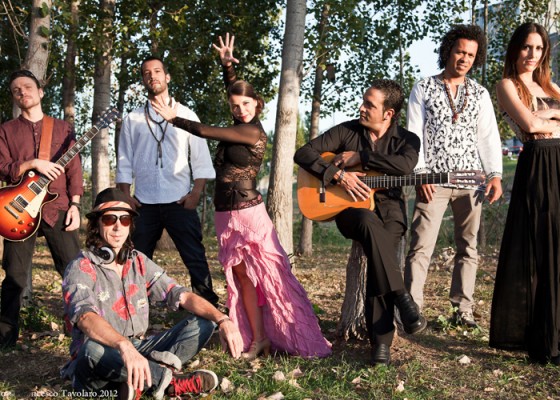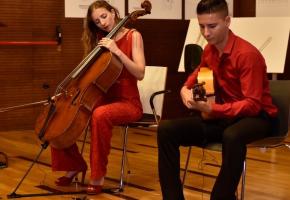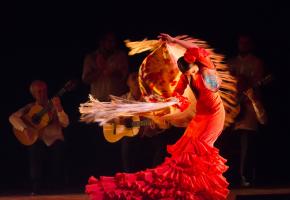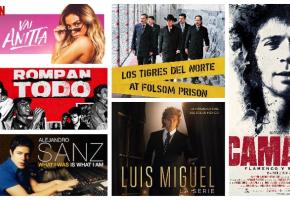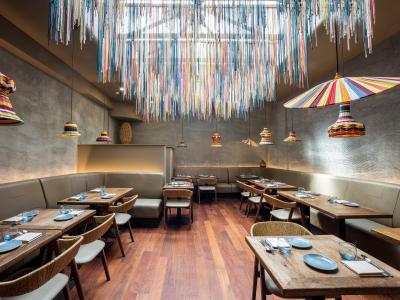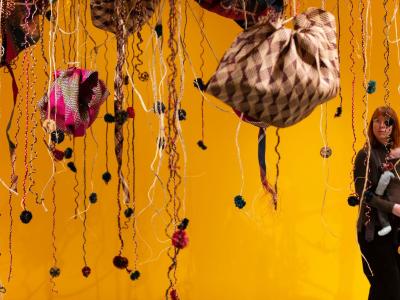How has your music evolved since Ojos de Brujo?
I think I’ve moved on. When you start experimenting, regardless of the label you use, you’re following a path. I am passionate about flamenco for obvious reasons: it’s the music of my origins. Having said that, I began my research in the 1990s, when I met Dani Macaco and Juan Luque. When I started to dream up Ojos de Brujos they pulled out but we carried on with the project. From that moment, that I started to appreciate and learn new musical languages that I saw as possible bridging points with flamenco, like folk and urban music. With Ojos de Brujo before and Lenacay now I’ve evolved naturally in ways that reflect the different synergies created by different people that have converged in the band at different times. What I mean is that with Lenacay we’re currently doing more electronic music because it’s something that our current team naturally lends itself to doing, whereas before we were more acoustic. We still had an electronic element before but now it’s more polished and better linked to the different flamenco styles. At the same time, the new members of the band are a breath of fresh air when it comes to carry on experimenting. The flamenco element is now more present and at the same time there’s a strong influence of soul, which I think could be explored further but using a language which is not our own and which has a different musicality. That opens up new musical territories, as you can hear, for instance, in If I let you or in Seven Days.
I’d like to ask you something related to language. Can you really make flamenco in English?
I don’t pretend to be doing flamenco. It would be wrong to try to frame something in some place where it doesn’t fit, like a square objet in a round box. It’s not about that. What I am trying to do is to expand a musical language independently of whether it can be seen as flamenco or not. It is true that because of my own identity, and not to just copy what is being done elsewhere, I try to filter my work through the lens of flamenco. And I realise that I’ve been experimenting with flamenco for the last 20 years, looking for those blending or connecting points that can be found in different musical languages. I think there’s great scope for research and experimentation when you use a language that’s not your own. You can take on board its musicality and mix it with your own language, but in a way that doesn’t jar. That’s the challenge and has been done before many times, but often it’s like mixing water and oil. The key is to do it in an amalgamating way that goes beyond just being innovative or original. That border has already been crossed and now it’s really about searching for something else.
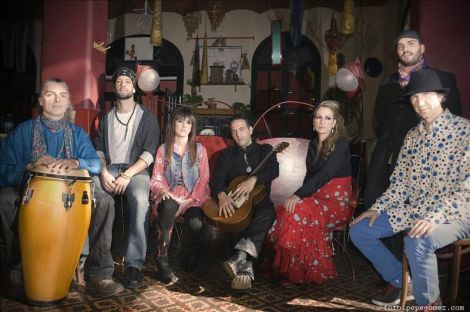
My own research with Ojos first felt like torrent of ideas. I experimented with many different sounds, some of which worked, others didn’t. Then I worked working on a language that went beyond, let’s say mixing bulerías or electronic music as part of taranta , because it’s not just about the elements that you combine but about the energy that you want to transmit, whether you call it flamenco or not.
And what is it that you want to transmit right now?
As a musician I want to transmit the same as a painter or another musician would. I have a horizon from there I want to express myself with as rich a language as I can. I’ve realised that different types of musical languages e.g. transmetal, funky, flamenco or pop, have specific codes that express different feelings. What drives me is how to enhance and develop that expressive potential. To put it differently, if through funky you’re able to transmit a particular kind of story, and with flamenco you need to resort to other devices to communicate that same story, by integrating languages you can get much closer to the core of the story and express it through a wider musical, let’s say “polysemy”.
And what type of feelings and stories feature in your music and your songs?
It depends on the members of the group at any one time. Lenacay is a mixture of urban and roots music. What we’re trying to convey is that ‘easy-going, here and now, let’s have a good time’ feel about life, and at the same time remain artistically grounded without going too far out. It’s true that artists have to open their eyes and see what’s going on around them and communicate it to their audience. In Ryma you’ve got light-hearted songs like Cielo Azul that goes: ‘I’m so happy and everything’s cool and great and so on’ or themes like Identidad, a funky rumba that acknowledges the difficult times we’re going through, with budget cuts and all, but which tries to uplift the mood by stressing that no matter what, they cannot crash your identity. Across those two poles there’s a wide range of themes including love and other things. I think that if you want to tackle a topic in depth you need to find the right space. For example, this coming June I’m staging a musical at the Grec Theatre in Barcelona as part of the Grec Festival. It’s called the DNA of the Soul. The title already gives you an idea of its depth. Different formats allow for better treatment of certain topics. In this case, and even though I’m wondering off the question a bit, The DNA of the Soul draws a parallel between the DNA of the human genome and the DNA of the soul, where the genes of the soul are the feelings. So I use flamenco as the connecting thread, and each feeling is expressed through a story. I also use different musical languages and dance: hip hop, contemporary, flamenco, electronic… I’m doing this with Lenacay because of their very plasticity of the team.
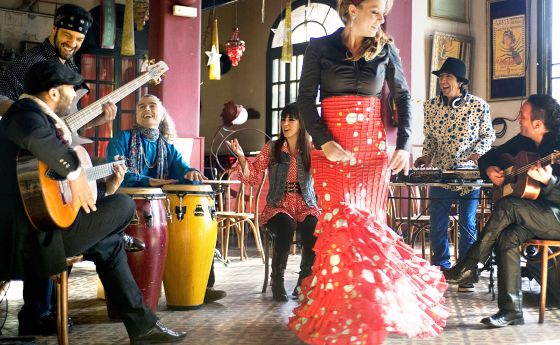
We’ve listened to Identidad and we now understand better what you were trying to say with this piece. Have you tackled in a more obvious or direct way social issues in your music?
Everything in due time, I’d say. When you start a new band there’s so much to tell that going straight onto specific issues could be a bit “pretentious”. First, people have to get to know who you are and where you’re coming from. Then you may be able to cause some impact. It’s like any relationship; first you fall in love with what you see and then you get to know the person. With Ryma we’re doing exactly what we did with the first album of Ojos de Brujo – Vengue - which was very much a mission statement: ‘We’re here and we’re easy-going and yes, we talk about some stuff but in a light-hearted kind of way’. When you really want to deal with some serious stuff first you need to be sure you’ve got your audience and they’re going to listen and be sure that what you say will have some impact. The first Ojos de Brujo album was more about form. We were trying to make ourselves known and connect with people. With Ryma and Lenacay I’ve done the same. First you’ve got to present the new people in the band and you’ve got to play a bit with form and style so you don’t end up with copy-paste of what you’ve done before. You need to find the DNA of your people first.
What have you got in store for your London debut?
We’re looking forward to it. It’s going to be a baptism of fire after Womex last year, especially because we’re sharing the bill with people like Yerbabuena and Estrellita. We’re happy and proud of this. What are we going to do? Well, it’s our mision statement. We’re gonna show people who we are and what wavelength we’re on. We’ll have dance on stage, with this girl I brought from The DNA of the Soul. We’re also experimenting with a new form of percusion and drums, called percutería, with our Brasilian percussionist. Basically, it will be an update of Ryma based on our latest experiments. We’ve thrown in some electric guitar, which I hadn’t tried before, so maybe it sounds more like rock, I guess. It will be like saying ‘hello, we’re here and this is what we sound like live’. There’s already a bit a background history with me and Panko from Ojos de Brujo being there, but this is another story and I want to introduce the new team.
What has the reception been like in Spain?
There’s been a lot of curiosity, of course. After leading a band like Ojos de Brujo with Panko for such a long time people were eager to know what we’ve come up with now. As it happens with any change, some people expect to see more Ojos de Brujo and others are more open to some evolution. There’s all sort of responses, from the purists who want to continue with what we did before, which is not going to happen because we’re a different band to others who enjoy what we’re doing right now.
And how has the gypsy world welcomed Lenacay?
Well, at the beginning it was very hard for me but not anymore. When some ten years ago I created a band with half my family in it, called it Ojos de Brujo, used words in caló and immersed myself in flamenco fusion, that raised a few eyebrows. People in the immediate context of my home town didn’t like it and wondered what the hell I was doing. With time we’ve been gradually understood; fifteen years on, it’s the opposite of how it was starting out. Now people listen to us with an open mind and there’s a lot of respect, which is mutual.
How about the older generation?
Exactly the same. Of course, I’ve already done all the hard work with Ojos de Brujo, which was a statement in favour of cross-cultural fusion. Ojos de Brujo incorporated words from the gypsy language of caló and that has had an impact. Having shared stage with people well established in the world of flamenco like Pepe Habichuela or Duquende, has meant that in a way we’ve been given me the OK, so to speak. All that has eased the way and now Lenacay is seen in a new light, as a new fusion story.
And abroad? How are you being received? We hear you’re off to Sweden tomorrow!
Yes, we’re in Sweden tomorrow and we’ve been in Greece. We’ve moved around. Last year we were in Puebla, Mexico.
How were you received in Mexico?
It was incredible. We’d like to go back this year with the whole band. We’ve travelled a lot in Mexico, North and South, and we it was amazing how they welcomed us. We played at a festival in Puebla and they loved it. We were also on radio and TV. Everywhere I went I took my guitar and played. Mexican hospitality was amazing.
<iframe width="560" height="315" src="http://www.youtube.com/embed/rOiUzJBHsvQ" frameborder="0" allowfullscreen></iframe>
From everything you say identity seems to stand out, as well as the whole question of searching and bridge crossings. Does your work reflect what’s going on inside of you as a human being?
Yes, you’re right. In fact, Ojos de Brujo was the result of my own identity search. I’ve never said this before in an interview. When you grow up as a curious gypsy, with a sister who is a flamenco dancer, and suddenly, at the age of 14, you swap flamenco for hip hop, that’s quite some a change. Then I start a break-dance group in the 1980s and gradually I venture into other musical landscapes. All that has stimulated me try out different ways of doing things. Ojos de Brujo was born out of that curiosity and that personal search, and also out of a desire to export the language of flamenco, which was only being spoken here, to the outside world, so other people could use its musical variables. Trying to make sense of what it means to a gypsy in a non-gypsy world or wondering if it’s actually the other way around, being a non-gypsy in a gypsy world, has triggered a chain reaction that’s thrown me in the direction of alternative means of musical expression, whether you want to call it flamenco or funky or rock, it’s just music. And I think I have succeeded in expanding flamenco beyond its borders so that others can use its language. If there’s something I am proud of is that before Ojos de Brujo there was nothing and afterwards new groups have appeared on the scene that are also pushing beyond. People like Chambao, el Bicho or la Niña are a new generation of musicians who are playing with different musical codes. If in the 1990s it seemed totally alien to talk about flamenco hip hop, I think now it’s perfectly acceptable.
Do you think you’ve set a trend?
I think so. It may sound a bit pretentious for a 43-year-old like me to go as far as saying that I’ve set a trend, but after 20 years working with music I think I’ve gained some perspective.
What would you like to add to conclude?
I think that it is through contrasts that we learn, and music fulfils that role. It creates shortcuts that enable us to understand what would otherwise be difficult to conceive. Through songs, we can comprehend the otherwise inexpressable.


